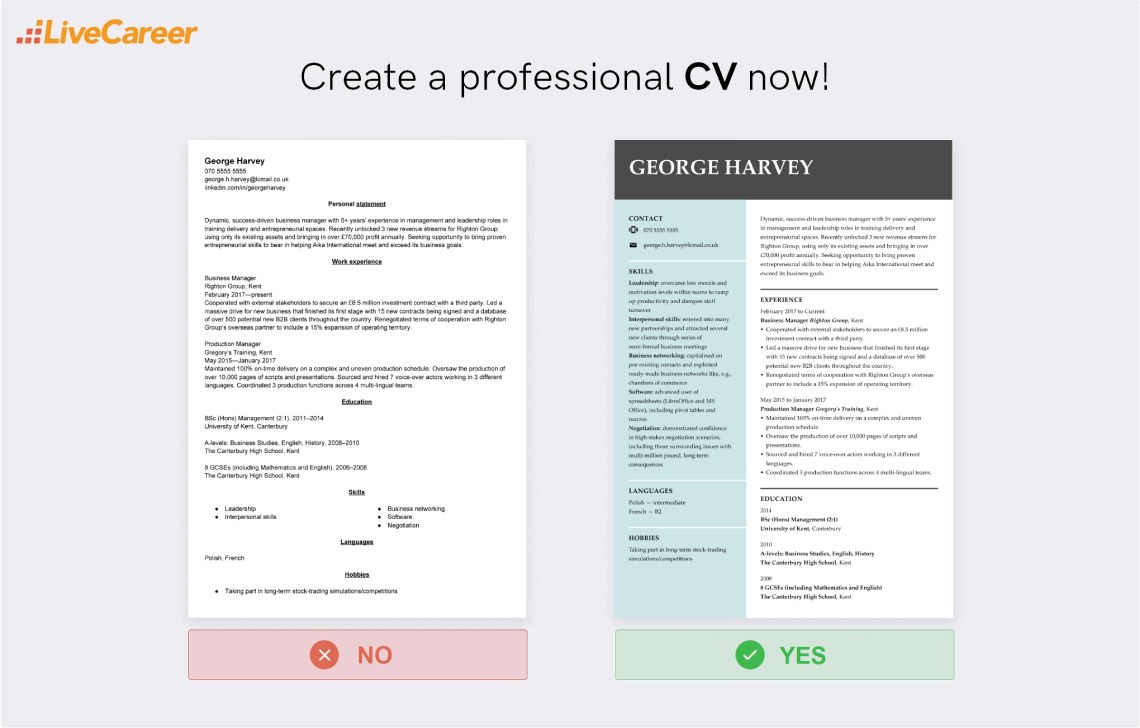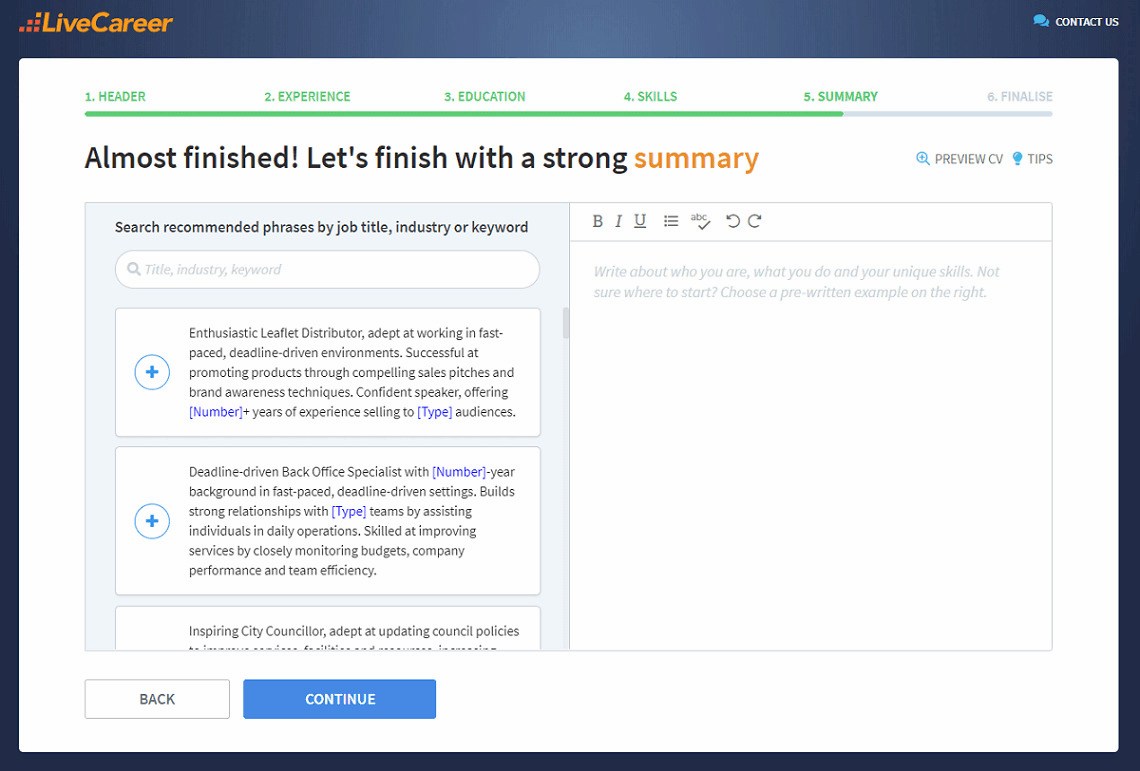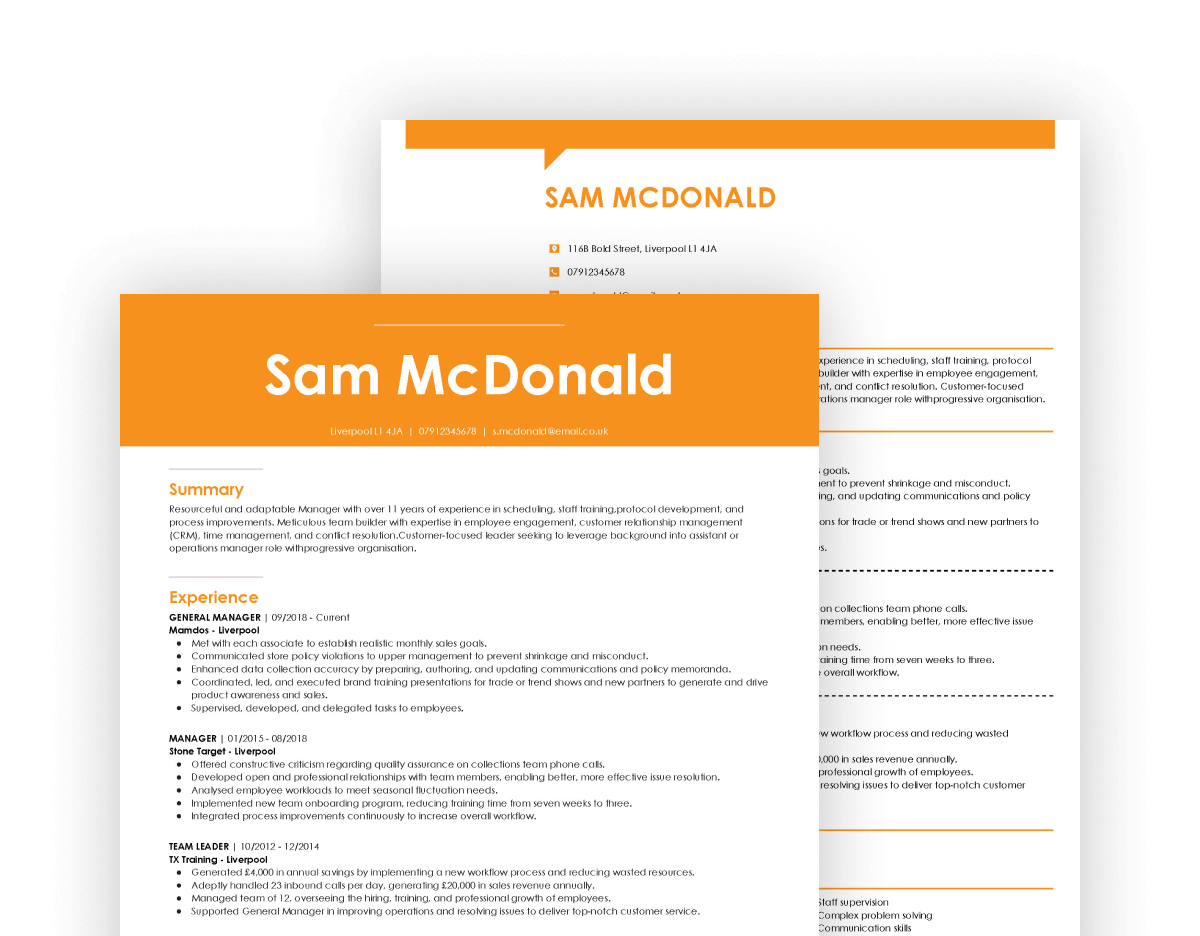How to Write an HR CV for 2025 (Examples)
HR professionals need CV pointers, too. See HR CV examples including HR work experience, get UK-based templates & plenty of good, expert advice.
Our customers were hired by:
There’s no denying that sending out speculative CVs is a bold move. The amount of effort you have to invest is pretty high, but the potential pay-off is well worth it. A speculative CV is the key part in a speculative job application—an application you send without waiting for a job opening to be advertised.
In a matter of minutes, we'll walk you through the process of writing a speculative CV, from go to woah. You’ll learn how to craft a laser-focused speculative CV that’s got your dream job in its sights.
In this guide, you'll get a speculative CV example with step-by-step instructions on crafting a top-notch speculative CV. Furthermore, you'll benefit from our expert tips and examples to make your speculative CV even better.
Create an effective CV in minutes. Choose a professional CV template and fill in every section of your CV in a flash using ready-made content and expert tips.

We created the sample on the right using our builder. See other good CV examples like this one.
Writing a CV for a certain job? You must see these guides:
George Harvey
070 5555 5555
george.h.harvey@lcmail.co.uk
linkedin.com/in/georgeharvey
Personal statement
Dynamic, success-driven business manager with 5+ years’ experience in management and leadership roles in training delivery and entrepreneurial spaces. Recently unlocked 3 new revenue streams for Righton Group, using only its existing assets and bringing in over £70,000 profit annually. Seeking opportunity to bring proven entrepreneurial skills to bear in helping Aika International meet and exceed its business goals.
Work experience
Business Manager
Righton Group, Kent
February 2017—present
Production Manager
Gregory’s Training, Kent
May 2015—January 2017
Education
BSc (Hons) Management (2:1), 2011–2014
University of Kent, Canterbury
A-levels: Business Studies, English, History, 2008–2010
The Canterbury High School, Kent
8 GCSEs (including Mathematics and English), 2006–2008
The Canterbury High School, Kent
Skills
Languages
Hobbies
Now here’s how to write a speculative CV:
By sending out a speculative CV you’re putting a document in front of someone that they neither asked for nor expected to receive. You’d better grab and hold their attention quickly, or they’ll move on with their busy day and forget about you and your CV. Your personal statement will be the first thing they read.
Use it to make the right kind of impression, and fast. A good personal statement does three basic things:
You’ll need to do a bit of research to know what will be attractive to a given company and what its goals are. Your best source of information here will be its website, especially the ‘about us’ section, which will often include its mission and values. Get a feel for the corporate culture while you’re at it.
There’s good and there’s bad news when it comes sending out speculative CVs. The bad news is that you’ll have to write a new personal statement for each and every CV you send. The good news is that it’s much easier than it might seem. All you need to do is write 3–4 sentences, about 50–150 words.
Use the following questions to guide your writing—aim to answer them all in your 3–4 sentences:
Even though it comes first in your CV, it’s much better if you write your personal statement last, or at least after you’ve prepared your job descriptions (i.e. achievements). The whole process will be much simpler since you’ll have all the ingredients ready to go. So keep it in mind and come back later.
Dynamic, success-driven business manager with 5+ years’ experience in management and leadership roles in training delivery and entrepreneurial spaces. Recently unlocked 3 new revenue streams for Righton Group, using only its existing assets and bringing in over £70,000 profit annually. Seeking opportunity to bring proven entrepreneurial skills to bear in helping Aika International meet and exceed its business goals.
A strong CV summary will convince the recruiter you’re the perfect candidate. Save time and choose a ready-made personal statement written by career experts and adjust it to your needs in the LiveCareer CV builder.

This is the point at which you’ll need to choose the right CV format for you. There are three major CV formats to choose from:
There’s also an academic CV format for academic teaching and research jobs. It’s basically an expanded chronological format, though.
Each of the above CV formats puts emphasis on something else:
A skills-based format is a great choice for creatives, many freelancers, and people transitioning from military service to civilian employment. A combination format is a better fit for people who are changing careers or who have significant gaps in their employment. But think twice before choosing either.
By far the most common CV format is the chronological format, with its focus on work experience and general overview of skills. This is the default format, it’s what employers and recruiters expect to see and it’s most easily parsed by Applicant Tracking Systems (ATSs). Chances are it’s for you.
This guide will continue on the assumption that you’re writing a speculative CV using a chronological format. The work experience and skills sections will look quite different in a skills-based or combination speculative CV. Everything else will be very similar.
The key to writing impressive, compelling job descriptions is to forget about listing duties and responsibilities and to instead focus on achievements. Achievements describe the measurable benefits that your employer gleaned from your actions and initiative. They’re backed up by facts and figures.
Use accomplishment statements to formulate your job-description bullet points. Start each bullet point with a dynamic verb like ‘organised,’ ‘reduced,’ or ‘negotiated.’ Describe an action you took at work (perhaps as part of a project or in response to a problem) and the benefits that flowed to your employer.
Starting with your current or most recent job, use the following template to create a subheading for each job:
[Job Title]
[Company Name, Location]
[Dates of Employment]
Then add up to six achievements under each subheading, in bullet-point form.
If you are writing a CV with little or no relevant experience, then focus on any internships, placement work or volunteer work you’ve done. If you have no relevant work experience at all, then put this section after your education section and consider writing a student CV instead—it can be adapted to a speculative CV.
Business Manager
Righton Group, Kent
February 2017—present
Production Manager
Gregory’s Training, Kent
May 2015—January 2017
Education requirements differ from industry to industry, but an education section is almost always required. Keep this section brief and on-point. Don’t list grades or any other superfluous details. Start from your most recent qualifications. There’s no need to mention high school if you have a university degree.
Use the following template for both university degrees and other tertiary qualifications, like NVQs:
[Degree Type] [Degree Name](Degree Class)
[Institution Name], [Institution Location], [Years Attended]
Include an expected graduation date if you’re currently studying. If you don’t have a university degree, then use the following templates to detail your high school education:
A-levels: [Subject Name 1], [Subject Name 2], [Subject Name 3]
[School Name], [School Location], [Years Attended]
[n] GCSEs (including Mathematics and English)
[School Name], [School Location], [Years Attended]
where n is the number of GCSEs you completed.
BSc (Hons) Management (2:1)
University of Kent, Canterbury, 2011–2014
A-levels: Business Studies, English, History
The Canterbury High School, Kent, 2008–2010
8 GCSEs (including Mathematics and English)
The Canterbury High School School, Kent, 2006–2008
Ultimately, the most important indicator of how much value you’ll bring to a given company is your skill-set. Your experience (the sum of your achievements) is really just an indication of your underlying skills. Fill in the picture further by including a carefully curated list of skills in your speculative CV.
First, make a master list of all your skills. Create a new document and list all the relevant work skills you can think of. Add a sentence to each skill that describes how you’ve demonstrated that skill. If you can’t do this for a given skill, then it drops off your list. Include only that which you can back up.
Save this master file and keep it for future speculative CVs and regular job applications. Now all you need to do is copy 5–10 relevant skills from this list into your speculative CV. But wait a minute, how will you know which skills are relevant to this particular job when there’s no job advert to refer to?
This is another section for which you’ll have to do some background research on the company to which you’re applying. Once again, trawl its website looking for hints. You might get lucky and come across old or archived job offerings. Otherwise, you might have to read between the lines or try cross-referencing LinkedIn. You can also check job postings from similar companies.
The purpose behind your speculative CV is to present as full a picture of you as an employee in as compact a form as possible. Round out your CV and complete this picture by adding extra sections. You could add sections on:
Languages
Hobbies
Sending out your speculative CV without a cover letter would be poor form, to say the least. Not only would it be extremely unlikely to get you a response, it’d leave a negative impression of you overall. Always send your speculative CV out with an appropriately tailored speculative cover letter.
A good speculative cover letter will follow the standard UK business letter format, which means that it’ll include:
The body of a compelling speculative cover letter will be made up of three main parts:
All this should leave you with a cover letter that’s between half an A4 page and a full A4 page long, about 250–400 words in total.
You don’t have to be a CV writing expert. In the LiveCareer CV builder you’ll find ready-made content for every industry and position, which you can then add with a single click.

I hope this article has helped you take the brave but potentially rewarding step of sending out a speculative CV – it really can be the road to your dream job. Please leave any questions, comments or experiences or advice you’d like to share in the comments section below.
Our editorial team has reviewed this article for compliance with Livecareer’s editorial guidelines. It’s to ensure that our expert advice and recommendations are consistent across all our career guides and align with current CV and cover letter writing standards and trends. We’re trusted by over 10 million job seekers, supporting them on their way to finding their dream job. Each article is preceded by research and scrutiny to ensure our content responds to current market trends and demand.
About the author
Since 2013, the LiveCareer UK team has shared the best advice to help you advance your career. Experts from our UK editorial team have written more than one hundred guides on how to write the perfect CV or cover letter.
Rate this article:
Speculative cv
Average:

HR professionals need CV pointers, too. See HR CV examples including HR work experience, get UK-based templates & plenty of good, expert advice.
How to write a medical CV? Check out our medical CV template, including tips on how to write your first job application, specific to the UK.
How to write a restaurant manager CV? Check out our restaurant manager CV sample, including tips on restaurant manager CV format, specific to the UK.
Our customers were hired by: